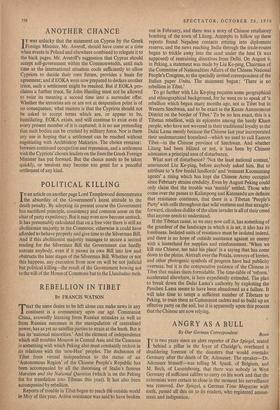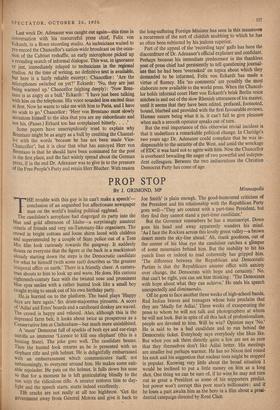ANGRY AS A BULL
By Our German Correspondent Bonn
IT is two years since an alert reporter of Der Spiegel, seated behind a pillar in the foyer of Claridge's, overheard a shuddering forecast of the disasters that would overtake Germany after the death of Dr. Adenauer. The speaker—Dr. Adenauer himself—was telling M. Spaak, of Belgium, and M. Bech, of Luxembourg, that there was nobody in West Germany of sufficient calibre to carry on his work and that the extremists were certain to close in the moment his surveillance was removed. Der Spiegel, a German Time Magazine with teeth, passed all this on to its readers, who registered amuse- ment and indignation. Last week Dr. Adenauer was caught out again—this time in conversation with his resourceful press chief, Felix von Eckardt, in a Bonn recording studio. As technicians waited to pre-record the Chancellor's nation-wide broadcast on the occa- sion of the Cabinet reshuffle, an early microphone picked up a revealing snatch of informal dialogue. This was, in ignorance or jest, immediately relayed to technicians in the regional studios. At the time of writing, no definitive text is available, but here is a fairly reliable excerpt : Chancellor: 'Are the microphones switched on yet?' Eckardt: `No, they are just being warmed up.' Chancellor (sighing deeply): 'Now Bren- tano is as angry as a bull.' Eckardt : 'I have just been talking with him on the telephone. His voice sounded less excited than at first. Now he wants to take me with him to Paris, and I have no wish to go.' Chancellor: 'Herr von Brentano must slowly accustom himself to the idea that you are my subordinate and not his. (Pause.) Erhard too has complained bitterly. . .
Some papers have unscrupulously tried to explain why Brentano might be as angry as a bull by crediting the Chancel- lor with the words 'because he has not been made Vice- Chancellor'; but it is clear that what has annoyed Herr von Brentano is that he should have been nominated for the post in the first place, and the fact widely spread about the German press, if in the end Dr. Adenauer was to give in to the pressure of the Free People's Party and retain Herr Blucher. With reason the long-suffering Foreign Minister has seen in this manoeuvre a recurrence of the sort of childish snubbing to which he has so often been subjected by his jealous superior.
Part of the appeal of the 'recording tape' gaffe has been the discomfiture of Dr. Adenauer's official explainer and confidant. Perhaps because his immediate predecessor in the thankless post of press chief had persistently to tell questioning journal- ists that he had been `overasked' on topics about which they demanded to be informed, Felix von Eckardt has made a virtue of fluency. His `no comments' are possibly the most elaborate now available to the world press. When the Chancel- lor holds informal court Herr von Eckardt's brisk Berlin voice stitches in and out of the slow Rhenish utterances of his master, until it seems that they have been edited, prefaced, footnoted, bound, blurbed and provided with the first favourable reviews. Human nature being what it is, it can't fail to give pleasure when such a smooth operator speaks out of turn.
But the real importance of this otherwise trivial incident is that it underlines a remarkable political change. In Claridge's two years ago Dr. Adenauer could complain that he was in- dispensable to the security of the West. and amid the wreckage of EDC it was hard not to agree with him. Now the Chancellor is overheard bewailing the anger of two powerful and indepen- dent colleagues. Between the two indiscretions the Christian Democrat Party has come of age.











































 Previous page
Previous page